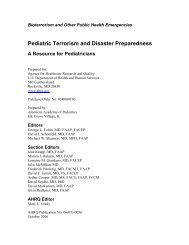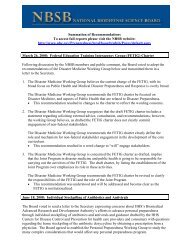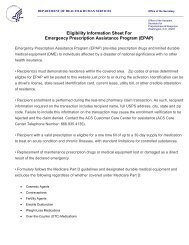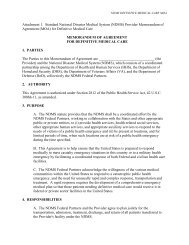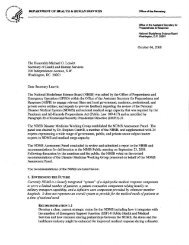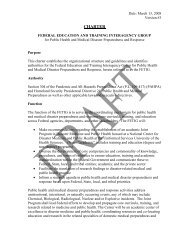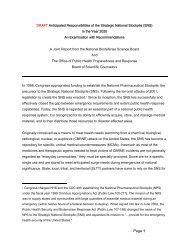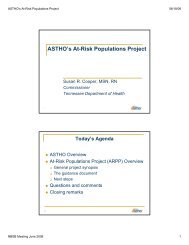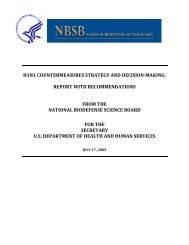(HPP) Performance Measure Manual
(HPP) Performance Measure Manual
(HPP) Performance Measure Manual
Create successful ePaper yourself
Turn your PDF publications into a flip-book with our unique Google optimized e-Paper software.
<strong>HPP</strong> 10.1<br />
Key Definitions<br />
Immediate Bed Availability (IBA): IBA is the<br />
concept whereby coalition partners provide an<br />
appropriate level of care to non-disaster and<br />
disaster-related patients during declared<br />
disasters with public health implications, by<br />
availing 20% of staffed hospital beds to higher<br />
acuity patients within four (4) hours of a disaster<br />
and identifying and providing the appropriate<br />
care for lower-acuity patients.<br />
Trigger: An event which initiates certain actions.<br />
Regional Surge Planning: Surge planning with a<br />
group of healthcare organizations located within<br />
a specified geographic region (see definitions of<br />
Surge Capacity and Surge Capability below).<br />
Surge: The state in which the capacity (volume<br />
of patients and requirements) and capabilities<br />
(the ability to treat or manage a medical<br />
condition) of a healthcare entity are above<br />
baseline requirements.<br />
Surge Capability: The ability to manage patients<br />
requiring unusual or very specialized medical<br />
evaluation and care. Requirements span the<br />
range of specialized medical and public health<br />
services (expertise, information, procedures,<br />
equipment, or personnel) that are not normally<br />
available at the location where they are needed.<br />
It also includes patient problems that require<br />
special intervention to protect medical<br />
providers, other patients, and the integrity of<br />
the healthcare organization.<br />
Surge Capacity: The ability to evaluate and care<br />
for a markedly increased volume of patients—<br />
one that challenges or exceeds normal<br />
operating capacity. Requirements may extend<br />
beyond direct patient care to include other<br />
medical tasks, such as extensive laboratory<br />
studies or epidemiologic investigations.<br />
Crisis Standards of Care: At the request of the<br />
U.S. Department of Health and Human Services’<br />
Office of the Assistant Secretary for<br />
Preparedness and Response, the Institute of<br />
Medicine convened the Committee on Guidance<br />
for Establishing Standards of Care for Use in<br />
Disaster Situations to develop guidance that<br />
State and local public health officials can use to<br />
establish and implement standards of care that<br />
should apply in disaster situations—both<br />
naturally occurring and man-made—under<br />
scarce resource conditions. The resulting<br />
guidance is referred to as ‘Crisis Standards of<br />
Care.’<br />
Medical Surge<br />
Pre-Incident<br />
Healthcare<br />
Preparedness<br />
Response<br />
Hospital Preparedness Program (<strong>HPP</strong>) <strong>Performance</strong> <strong>Measure</strong> <strong>Manual</strong>,<br />
Guidance for Using the New <strong>HPP</strong> <strong>Performance</strong> <strong>Measure</strong>s Page | 43




